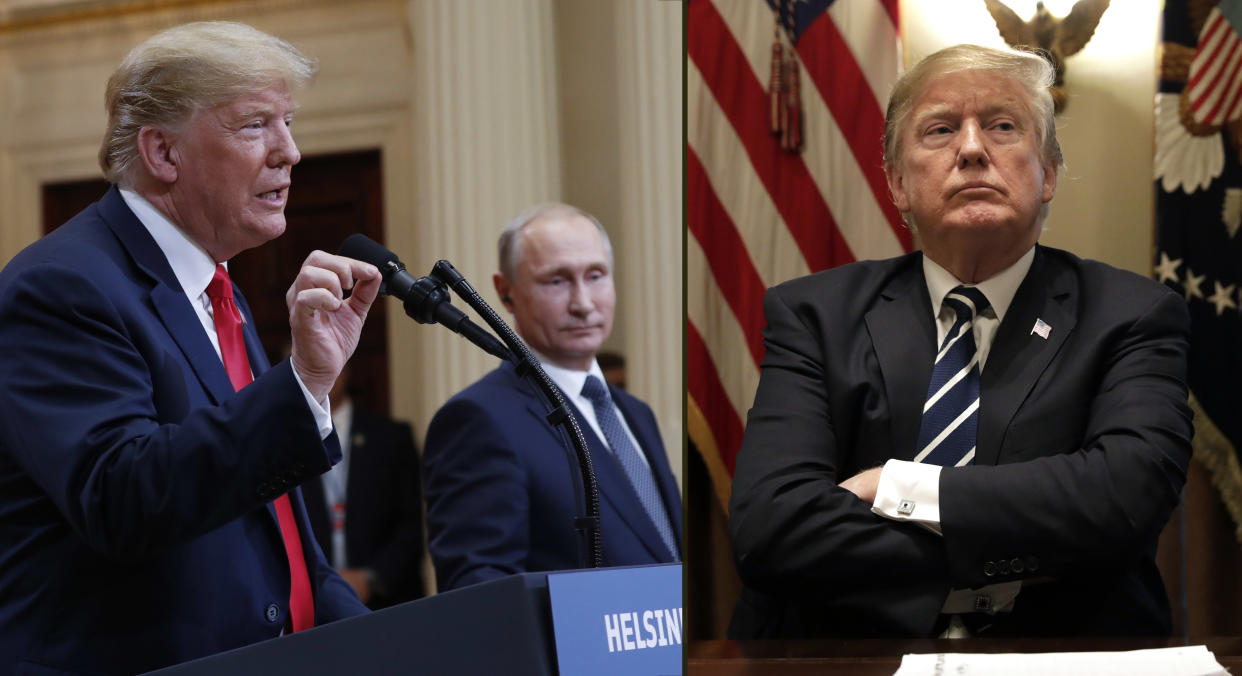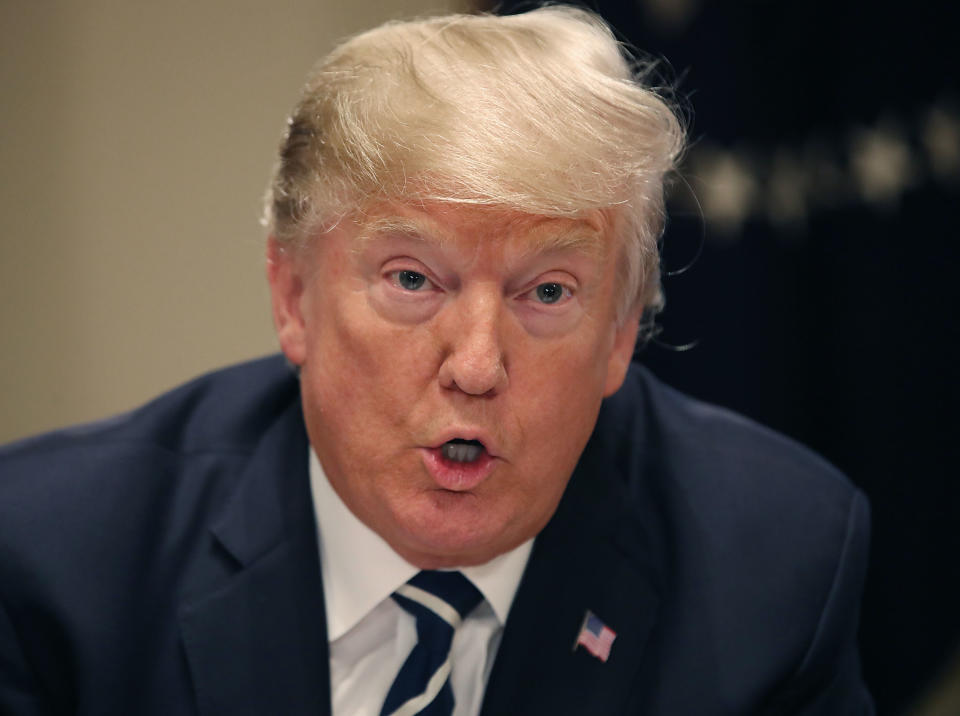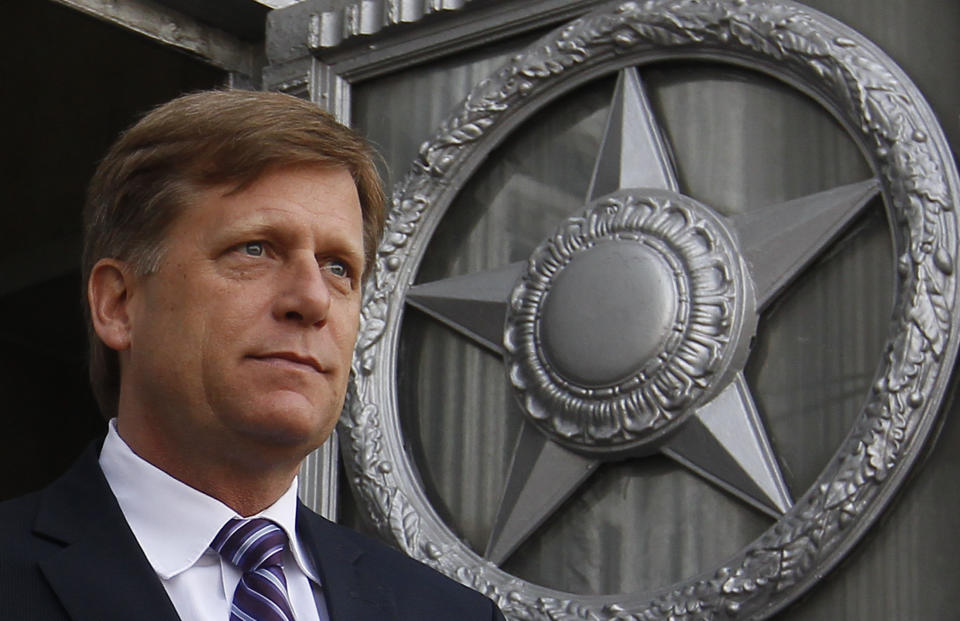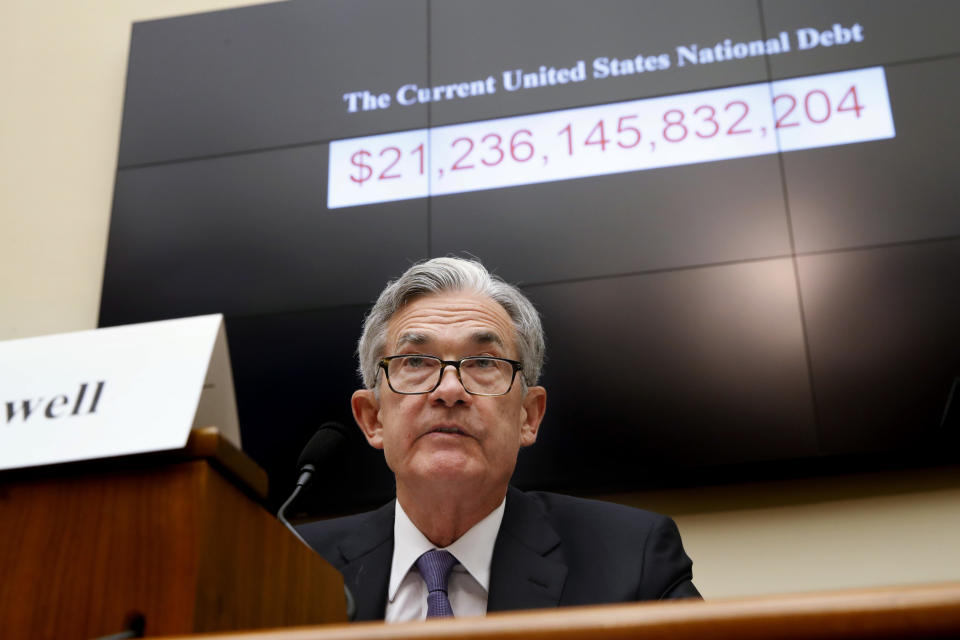The week Trump couldn't quite correct his own story


For President Trump, it was a week of communication breakdowns.
Trump emerged from his summit with Vladimir Putin for a joint press conference in Helsinki, Finland, on Monday, and promptly endorsed the Russian president’s denial that he had attempted to interfere in the 2016 presidential election, contrary to the unanimous conclusion of U.S. intelligence agencies.
“I have President Putin; he just said it’s not Russia,” Trump said in response to a reporter’s question. “I don’t see any reason why it would be.”
Trump’s jaw-dropping assertion sent shock waves throughout Washington and the world and prompted Dan Coats, his own director of national intelligence, to reaffirm what he has been saying for a year and a half about Russian interference in the campaign, adding that “it was important to take that stand on behalf of the intelligence community and on behalf of the American people.”
“We have been clear in our assessments of Russian meddling in the 2016 election and their ongoing, pervasive efforts to undermine our democracy, and we will continue to provide unvarnished and objective intelligence in support of our national security,” Coats said in a written statement.
With news outlets, members of Congress and the public expressing dismay over Trump’s performance at Putin’s side, the West Wing was left scrambling to try to contain the fallout.
Still, it took Trump more than 24 hours to attempt to clarify his comments. Reading from a prepared statement at the White House on Tuesday, Trump claimed he simply misspoke in Helsinki.
“I said the word ‘would’ instead of ‘wouldn’t,’” Trump said. “The sentence should have been, ‘I don’t see any reason why it wouldn’t be Russia,’ sort of a double negative. So you can put that in and I think that probably clarifies things pretty good.”

What was far from clarified was Trump’s true beliefs about the findings of his intelligence agencies. While the president seemed more open to accepting their conclusions than he had in the past, he also continued to qualify his support and question their evidence.
“I accept our intelligence community’s conclusion that Russia’s meddling in the 2016 election took place,” Trump said. “Could be other people also. A lot of people out there.”
‘Trump Derangement Syndrome!’
On Wednesday morning, facing continued criticism over his ham-fisted attempt to clarify his Helsinki comments, Trump accused his critics of being “haters” who wanted to see his diplomatic efforts fail.
“Some people HATE the fact that I got along well with President Putin of Russia,” Trump tweeted. “They would rather go to war than see this. It’s called Trump Derangement Syndrome!”
At a cabinet meeting later that day, Trump again tried to turn the page, telling reporters his recent meetings at the NATO summit in Brussels, in England with U.K. Prime Minister Theresa May, and in Helsinki with Putin were all “a tremendous success.” But as the press pool was exiting the room, Trump was asked by ABC News correspondent Cecilia Vega whether Moscow was “still targeting the United States.” The president shook his head and said “no.”
At a separate press briefing more than two hours later, White House press secretary Sarah Sanders claimed the president “was saying ‘no’ to answering questions” rather than parroting Putin’s assurances once more.
“The president and his administration are working very hard to make sure that Russia is unable to meddle in our elections, as they have done in the past,” Sanders said, noting that she had spoken with Trump after the Cabinet meeting.
When pressed by reporters about whether Trump had himself sought to clarify what his answer meant, Sanders said she was “interpreting what the president said.”
“I was in the room as well, and I didn’t take it the way you did,” she said.
In an interview with CBS News that aired Wednesday evening, Trump insisted that he agreed with the findings of his own intelligence officials that Russia had meddled in the 2016 election.
“I would say that is true, yeah,” Trump said.
Asked whether he held Putin personally responsible for that interference, Trump gave what amounted to his sternest criticism of the Russian leader on the subject to date.
“Well, I would, because he’s in charge of the country. Just like I consider myself to be responsible for things that happen in this country. So certainly, as the leader of a country, you would have to hold him responsible, yes.”
Despite deferring to Putin at the Helsinki news conference, Trump assured CBS’ Jeff Glor that he had privately admonished the Russian strongman, saying “We can’t have meddling; we can’t have any of that.”
‘Incredible offer’
On Thursday, Sanders was forced to issue yet another walk-back, this time on the question of whether Trump was considering Putin’s proposal to allow Russian investigators to interrogate American citizens suspected by Russia of criminal activity in Moscow, including former U.S. Ambassador Michael McFaul.
In Helsinki, Trump had praised the idea as an “incredible offer,” since Putin had coupled the proposal with a seemingly magnanimous gesture: letting U.S. investigators question the 12 Russian intelligence officers indicted last week for attempting to influence the 2016 election by, among other activities, hacking and releasing emails from top Democrats.

“I have great confidence in my intelligence people, but I will tell you that President Putin was extremely strong and powerful in his denial today, and what he did is an incredible offer,” Trump said as he stood next to Putin. “He offered to have the people working on the case come [to Russia] and work with their investigators with respect to the 12 people. I think that’s an incredible offer.”
The U.S. State Department blasted the idea as “absolutely absurd,” but that didn’t stop Sanders from attempting to portray it in a positive light.
“There was some conversation about it, but there wasn’t a commitment made on behalf of the United States,” Sanders said Wednesday. “The president will work with his team, and we’ll let you know if there’s an announcement on that front.”
One day later, with pressure building on the White House, Sanders changed course.
“It is a proposal that was made in sincerity by President Putin, but President Trump disagrees with it,” Sanders said in a statement Thursday. “Hopefully, President Putin will have the 12 identified Russians come to the United States to prove their innocence or guilt.”
The latest confusion further highlighted the questions that linger about the content of Trump’s one-on-one meeting with Putin. The pair were accompanied only by translators for a conversation that lasted more than two hours.
“I don’t know what happened in that meeting,” Coats said in an interview with NBC’s Andrea Mitchell at the Aspen Security Forum in Colorado on Thursday afternoon — more than three days after the summit.
While Trump did not cite a single breakthrough or deal having arisen from the summit, the Kremlin spent the days following the summit saying it was “ready for practical implementation of the agreements reached.” It didn’t say what agreements were reached, either.
‘Say that again’
Then Sanders announced that Trump had invited Putin to Washington for a follow-up meeting.
In Helsinki, @POTUS agreed to ongoing working level dialogue between the two security council staffs. President Trump asked @Ambjohnbolton to invite President Putin to Washington in the fall and those discussions are already underway.
— Sarah Sanders (@PressSec) July 19, 2018
That news caught some members of the president’s own administration off-guard.
During his interview in Aspen — which was being carried live on all three U.S. cable news networks — Coats was informed by Mitchell of Sanders’ tweeted announcement that Trump had extended an invitation to Putin to visit Washington, D.C., this fall.
“Say that again,” Coats said, laughing. He added: “OK. That’s going to be special.”
In Denver, FBI Director Christopher Wray also expressed his surprise over the invitation to Putin.
“I just heard about the meeting as I was walking down the hallway,” Wray said. “I’m going to wait until I get more of the facts.”
Fed up with the Fed
Not all of the administration’s walk-backs and curveballs this week sprang directly from the Putin meeting in Helsinki. Trump also caused a stir when he broke precedent and criticized the Federal Reserve over its decision to raise interest rates.
“I’m not thrilled,” the president told CNBC in an interview. “Because we go up, and every time you go up, they want to raise rates again. I don’t really… I am not happy about it. But at the same time I’m letting them do what they feel is best.”

After the interview with CNBC was broadcast, the stock market convulsed and the U.S. dollar plummeted, and it fell to Treasury Secretary Steven Mnuchin and National Economic Council Director Larry Kudlow to try to persuade the president that the Fed was acting appropriately.
After they apparently prevailed, at least for the moment, the White House released a statement later Thursday trying to assure investors.
“Of course the President respects the independence of the Fed. As he said, he considers the Federal Reserve Board Chair Jerome Powell a very good man and that he is not interfering with Fed policy decisions,” the statement read. “The President’s views on interest rates are well known and his comments today are a reiteration of those long held positions, and public comments.”
But Trump returned to the subject of rate hikes on Friday morning, issuing a tweet that cast the Fed in an adversarial light.
China, the European Union and others have been manipulating their currencies and interest rates lower, while the U.S. is raising rates while the dollars gets stronger and stronger with each passing day – taking away our big competitive edge. As usual, not a level playing field…
— Donald J. Trump (@realDonaldTrump) July 20, 2018
After a tumultuous week of walk-backs and clarifications that did little to soothe the president’s critics, it was no wonder that, by Friday evening, Trump was ready to try to change the subject back to something that might offer a more predictable response.
The NFL National Anthem Debate is alive and well again – can’t believe it! Isn’t it in contract that players must stand at attention, hand on heart? The $40,000,000 Commissioner must now make a stand. First time kneeling, out for game. Second time kneeling, out for season/no pay!
— Donald J. Trump (@realDonaldTrump) July 20, 2018
_____
Read more from Yahoo News:
Ex-NSA official: Russian hack of Democrats was ‘assembly line operation’
Brett Kavanaugh’s ex-boss: It’s ‘preposterous’ to demand his recusal from Mueller cases
‘I thought I would never see him’: Asylum seeker and son reunite after border separation
After Trump’s defense of Putin, sighs of resignation — but nobody’s resigning (yet)
Trump and Putin: The admiration is mutual, the benefits one-sided


